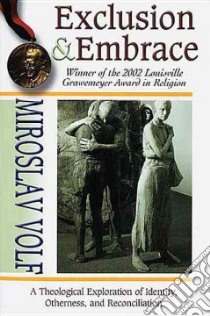Exclusion and Embrace - 9780687002825
Un libro in lingua di Miroslav Volf edito da Abingdon Pr, 1996
- € 27.70
- Il prezzo è variabile in funzione del cambio della valuta d’origine
Life at the end of the twentieth century presents us with a disturbing reality. Otherness, the simple fact of being different in some way, has come to be defined as in and of itself evil. Miroslav Volf contends that if the healing word of the gospel is to be heard today, Christian theology must find ways of speaking that address the hatred of the other. Reaching back to the New Testament metaphor of salvation as reconciliation, Volf proposes the idea of embrace as a theological response to the problem of exclusion.
Increasingly we see that exclusion has become the primary sin, skewing our perceptions of reality and causing us to react out of fear and anger to all those who are not within our (ever-narrowing) circle. In light of this, Christians must learn that salvation comes, not only as we are reconciled to God, and not only as we "learn to live with one another," but as we take the dangerous and costly step of opening ourselves to the other, of enfolding him or her in the same embrace with which we have been enfolded by God.
Is there any hope of embracing our enemies? Of opening the door to reconciliation? Miroslav Volf, a Yale University theologian, has won the 2002 Louisville Grawemeyer Award in Religion for his book, Exclusion & Embrace: A Theological Exploration of Identity, Otherness, and Reconciliation (Abingdon, 1996). Volf argues that “exclusion” of people who are alien or different is among the most intractable problems in the world today. He writes, “It may not be too much to claim that the future of our world will depend on how we deal with identity and difference. The issue is urgent. The ghettos and battlefields throughout the world—in the living rooms, in inner cities, or on the mountain ranges—testify indisputably to its importance.” A Croatian by birth, Volf takes as a starting point for his analysis the recent civil war and “ethnic cleansing” in the former Yugoslavia, but he readily finds other examples of cultural, ethnic, and racial conflict to illustrate his points. And, since September 11, one can scarcely help but plug the new world players into his incisive descriptions of the dynamics of interethnic and international strife.
Exclusion happens, Volf argues, wherever impenetrable barriers are set up that prevent a creative encounter with the other. It is easy to assume that “exclusion” is the problem or practice of “barbarians” who live “over there,” but Volf persuades us that exclusion is all too often our practice “here” as well. Modern western societies, including American society, typically recite their histories as “narratives of inclusion,” and Volf celebrates the truth in these narratives. But he points out that these narratives conveniently omit certain groups who “disturb the integrity of their ‘happy ending’ plots.” Therefore such narratives of inclusion invite “long and gruesome” counter-narratives of exclusion—the brutal histories of slavery and of the decimation of Native American populations come readily to mind, but more current examples could also be found.
Most proposed solutions to the problem of exclusion have focused on social arrangements—what kind of society ought we to create in order to accommodate individual or communal difference? Volf focuses, rather, on “what kind of selves we need to be in order to live in harmony with others.” In addressing the topic, Volf stresses the social implications of divine self-giving. The Christian scriptures attest that God does not abandon the godless to their evil, but gives of Godself to bring them into communion. We are called to do likewise—“whoever our enemies and whoever we may be.” The divine mandate to embrace as God has embraced is summarized in Paul’s injunction to the Romans: “Welcome one another, therefore, just as Christ has welcomed you” (Romans 15:7).
Susan R. Garrett, Coordinator of the Religion Award, said that the Grawemeyer selection committee praised Volf’s book on many counts.
Informazioni bibliografiche
- Titolo del Libro in lingua: Exclusion and Embrace
- Sottotitolo: A Theological Exploration of Identity, Otherness, and Reconciliation
- Lingua: English
- Autore: Miroslav Volf
- Editore: Abingdon Pr
- Collana: Abingdon Pr (Paperback)
- Data di Pubblicazione: 01 Novembre '96
- Genere: RELIGION
- Argomenti : Identification (Religion) Reconciliation Religious aspects Christianity
- Pagine: 336
- Dimensioni mm: 234 x 152 x 19
- ISBN-10: 0687002826
- EAN-13: 9780687002825


